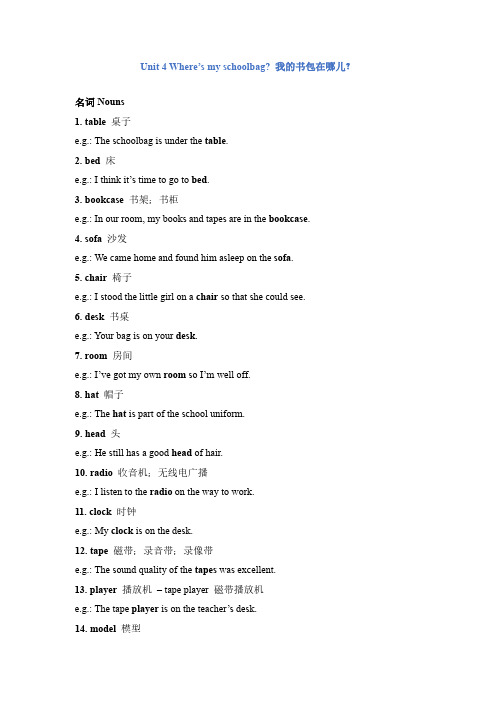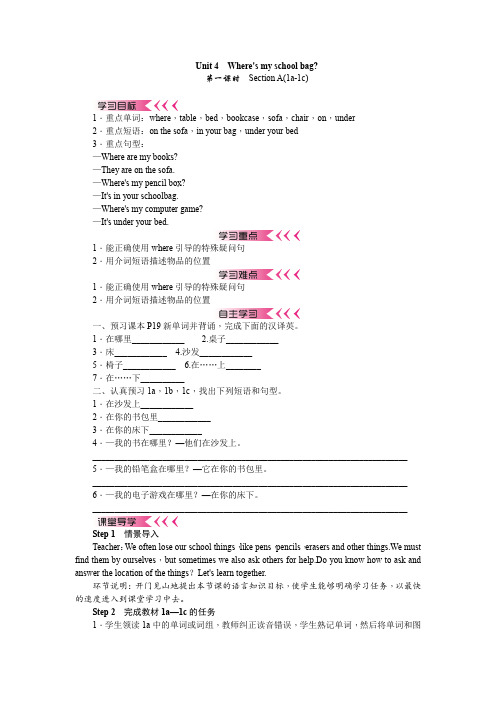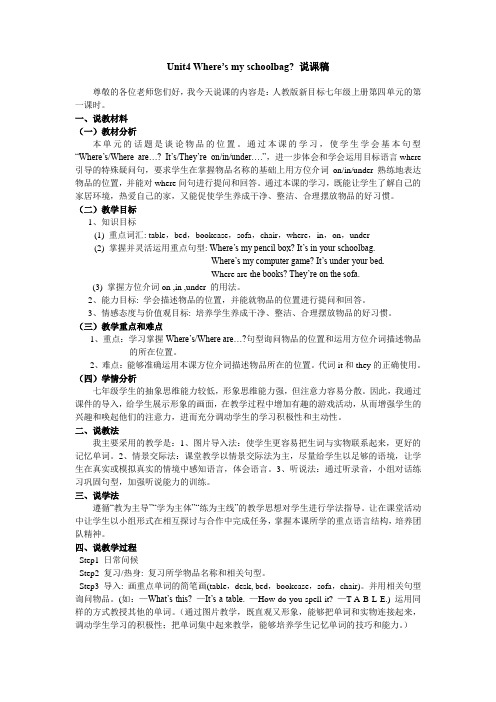人教版七年级英语上册《Unit 4 Where's my schoolbag》同步练习含答案
- 格式:doc
- 大小:59.00 KB
- 文档页数:12

Unit 4 Where’s my schoolbag? 我的书包在哪儿?名词Nouns1. table 桌子e.g.: The schoolbag is under the table.2. bed床e.g.: I think it’s time to go to bed.3. bookcase书架;书柜e.g.: In our room, my books and tapes are in the bookcase.4. sofa 沙发e.g.: We came home and found him asleep on the sofa.5. chair 椅子e.g.: I stood the little girl on a chair so that she could see.6. desk 书桌e.g.: Your bag is on your desk.7. room房间e.g.: I’ve got my own room so I’m well off.8. hat帽子e.g.: The hat is part of the school uniform.9. head头e.g.: He still has a good head of hair.10. radio收音机;无线电广播e.g.: I listen to the radio on the way to work.11. clock时钟e.g.: My clock is on the desk.12. tape磁带;录音带;录像带e.g.: The sound quality of the tapes was excellent.13. player播放机– tape player 磁带播放机e.g.: The tape player is on the teacher’s desk.14. model模型e.g.: This model was two years in the making.15. plane飞机– model plane 飞机模型e.g.: The white model plane is hers.动词Verbs1. come 来;来到– come on 快点儿e.g.: It was very good of you to come.2. think认为;想;思考e.g.: I think we should go back to first principles.3. know知道;了解e.g.: I don’t know what you’re on about.形容词Adjectives1. tidy 整洁的;井井有条的e.g.: They sat in her neat and tidy kitchen.副词Adverbs1. where在哪里;到哪里e.g.: Where did you go to school?2. everywhere处处;到处;各个地方e.g.: Gina’s books are everywhere – on her bed, on the sofa and under the chair.3. always总是e.g.: I always think of you as one of the family.代词Pronouns1. their他(她、它)们的e.g.: They both had some right on their side.2. our我们的e.g.: It’s time to put our plan into operation.介词Prepositions1. on在……上e.g.: There’s a mark on your skirt.2. under在……下e.g.: The English books are under the radio.连词Conjunctions1. but但是e.g.: Her job is hard work, but the pay is good.感叹词Interjections1. yeah是的;对e.g.: Do you want to go through it all? ------ Yeah, if you want.Grammar Points 语法点1. Where疑问句2. 介词on, in, under3. 连词andWhere’s the map? It’s in your grandparents’ room. Where are my books? They’re on the sofa.Where’s his pencil box? It’s in his schoolbag.Where’s your ruler? It’s under the chair.Where are their keys? They’re on the table.Where’s = Where isUnit 5 Do you have a soccer ball? 你有足球吗?名词Nouns1. tennis 网球e.g.: I’m not much good at tennis.2. ball球e.g.: Please give me my ball back.3. ping-pong乒乓球e.g.: I like ping-pong. It’s easy for me.4. bat 球棒;球拍e.g.: Tom has a baseball, but he doesn’t have a baseball bat.5. soccer (英式)足球– soccer ball (英式)足球e.g.: I don’t have a soccer ball, but my brother Alan does.6. volleyball 排球e.g.: I have two soccer balls, two volleyballs, four basketballs and five baseballs.7. basketball篮球e.g.: I enjoy playing basketball.8. TV (= television) 电视;电视机e.g.: We’re buying a new TV with the money.9. sport体育运动e.g.: I like most sports, but tennis is my first love.10. class班级;课e.g.: In this class, students will learn how to speak English.11. classmate同班同学e.g.: I play ping-pong with my classmates after class.动词Verbs1. have 有e.g.: I don’t have that much money on me.2. let允许;让– let’s = let us 让我们(一起)e.g.: Next time you’re here let’s have lunch together.3. go去;走e.g.: I didn’t want to go to a large university.4. has(have 的第三人称单数形式)有e.g.: The latest model has over 100 new features.5. get去取(或带来);得到e.g.: It will be months before we get the results.6. play参加(比赛或运动);玩耍e.g.: You’ll have to play inside today.7. sound听起来好像e.g.: It sounds as if you have grown apart from Tom.8. watch注视;观看– watch TV 看电视e.g.: I could sit and watch the river all day long.9. like喜欢;喜爱e.g.: You’ll like her once you get to know her.形容词Adjectives1. late迟到e.g.: As often as not (往往), he’s late for work.2. great美妙的;伟大的e.g.: We’ll have a great time, you’ll see.3. interesting有趣的e.g.: That looks like an interesting book.4. boring没趣的;令人厌倦的e.g.: She found her job very boring.5. relaxing轻松的;令人放松的e.g.: It’s a relaxing car to drive long distance.6. same相同的e.g.: I’d like one the same as yours.7. easy容易的;不费力的e.g.: This is not an easy task.副词Adverbs1. only只;仅e.g.: There’s only one sure way to do it.代词Pronouns1. us(we的宾格)我们e.g.: It was a testing time for us all.2. we我们e.g.: We’ll be there in less than no time.3. them(they的宾格)他(她、它)们e.g.: I can probably make the time to see them.介词Prepositions1. with和……在一起;带有;使用e.g.: I had a long conversation with her the other day.感叹词Interjections1. hey嘿;喂e.g.: Hey, that’s an idea! And we could get a band, as well.兼类词Words with multiple part of speech1. do (第三人称单数形式does)aux v. & v.用于构成否定句和疑问句;做;干e.g.: What are you doing this evening?2. fun adj.有趣的;使人快乐的n.乐趣;快乐e.g.: We had a lot of fun at that party.3. love v. & n.爱;喜爱e.g.: He said he would love her forever.4. after prep. & conj.在……以后e.g.: I’ve told you time after time not to do that.其他(专有名词、地名、人名等)1. Bill 比尔(男名)Grammar Points 语法点1. 一般现在时to have2. Yes/No一般疑问句及简短回答3. 肯定句与否定句4. 性质形容词5. 连词butDo you have a baseball? Yes, I do. / No, I don’t. I have a volleyball.Do you have a ping-pongYes, I do. / No, I don’t. I have a ping-pong ball.bat?Does she have a tennis ball? Yes, she does. / No, she doesn’t. She has a baseball. Does he have a soccer ball? Yes, he does. / No, he doesn’t. He has two ping-pong bats. Do they have a basketball? Yes, they do. / No, they don’t. They have a volleyball. don’t = do not doesn’t = does notUnit 6 Do you like bananas? 你喜欢香蕉吗?名词Nouns1. banana 香蕉e.g.: I don’t bananas, but I like oranges and apples.2. hamburger汉堡包e.g.: She was eating a hamburger.3. tomato西红柿e.g.: The tomato hit the wall with a splat.4. ice-cream 冰激凌e.g.: Today you can buy hundreds of flavors of ice-cream.5. salad 沙拉e.g.: John likes salad, and it’s his birthday.6. strawberry 草莓e.g.: I think John likes strawberries and apples.7. pear梨e.g.: There are lots of pear trees near the house.8. milk牛奶e.g.: Do you take milk in your tea?9. bread面包e.g.: Could you stop by the store on the way home for some bread?10. birthday生日e.g.: John’s birthday dinner is next week.11. dinner(中午或晚上吃的)正餐e.g.: I’d like to take you out to dinner tonight.12. week周;星期e.g.: I could come next week, or the week after.13. food食物e.g.: They are at the end of their food supply.14. burger (= hamburger) 汉堡包e.g.: You can have a burger, but you can’t have fries as well.15. vegetable蔬菜e.g.: I hope to have a vegetable plot.16. fruit水果e.g.: We buy our fruit and vegetables at the market.17. apple苹果e.g.: The apple is full of worms.18. egg蛋;鸡蛋e.g.: Eggs are graded from small to extra-large.19. carrot胡萝卜e.g.: Would you like some more carrot?20. rice大米;米饭e.g.: We eat rice every singe day.21. chicken鸡肉e.g.: I like chicken for dinner.22. breakfast早餐;早饭e.g.: What do you like for breakfast?23. lunch午餐e.g.: I’m ready for some lunch.24. star明星;星星e.g.: She was the star of many popular TV series.25. habit习惯e.g.: David asks the volleyball star, Cindy Smith, about her eating habits.26. question问题e.g.: I spent most time on the first question.动词Verbs1. eat 吃e.g.: I like ice-cream, but I don’t eat it.2. want需要;想要e.g.: You don’t want to do it like that.3. be变成e.g.: He wants to be a pilot when he grows up.形容词Adjectives1. right 正确的;适当的e.g.: I sincerely believe that this is the right decision.2. healthy健康的e.g.: Mary gave birth to a healthy baby girl.副词Adjectives1. sure当然;肯定;一定e.g.: I’m sure you’ll get there in the end.2. then那么e.g.: Right then, where do you want the table to go?3. well好;令人满意地e.g.: The kids all behaved well.4. really真正地e.g.: They are not really my aunt and uncle.连词Conjunctions1. so(引出评论或问题)那么e.g.: So, what have you been doing today?短语Expressions1. think about 思考;思索e.g.: I’ll think about it nearer the time.2. How about…?(提出建议)……怎么样?e.g.: How about burgers, vegetable salad, and some fruit?Grammar Points 语法点1. 一般现在时to like2. Yes/No一般疑问句及简短回答3. 肯定句与否定句Do you like salad? Yes, I do. / No, I don’t.Do they like pears? Yes, they do. / No, they don’t.Does she like tomatoes? Yes, she does. / No, she doesn’t.I like oranges. I don’t like bananas.We like rice. We don’t like hamburgers.He likes ice-cream. He doesn’t like vegetables.4. 可数与不可数名词Countable nouns Uncountable nouns Countable anduncountable nounshamburgers, eggs, oranges, bananas, apples, pears, carrots, vegetables, tomatoes, strawberries milk, bread, rice food, fruit, ice-cream, salad,chicken。

Unit 4 where’s my schoolbag?where 在哪里;到哪里table 桌子bed 床bookcase 书架;书柜 =bookshelf,bookshop 书店 bookmark 书签bookstall书亭,书摊sofa 沙发chair 椅子on 在.......上under 在.......下come 来;来到come on 快点儿desk 书桌think 认为;想;思考room 房间their 他(她、它)们的hat 帽子head 头yeah 是的;对know 知道;了解radio 收音机;无线电广播clock 时钟tape 磁带;录音带;录像带player 播放机tape player 录音机model 模型plane 飞机model plane 飞机模型tidy 整洁的;井井有条的but 但是our 我们的everywhere 处处;到处;各地always 总是1.radio n.收音机;无线电广博listen to the radio 听收音机 on the radio 通过广播/收音机2.clock n. 时钟against the clock 抢时间 alarm clock 闹钟 like clock (如始终一般)准确地o’clock ……点钟(对比clock 表示“钟表”)与watch 的辨析,见七上unit33.tape n.磁带;录音带;录像带tape player 磁带播放机 CD player CD播放机player此处意为“播放机”,为可数名词,还有运动员的意思。
4.plane 飞机model plane 飞机模型 on a plane 在飞机上catch a plane 赶飞机 by plane 乘飞机5.tidy adj.整洁的;井井有条的 v.使……保持整洁;整理;收拾untidy 不整洁的;凌乱的近义词:neat adj.整洁的 clean adj.干净的;v.打扫keep tidy 保持整洁 neat and tidy 干净整齐6.but conj.但是用于连接两个并列的成分,表示前后意义上的转折或两种情况的对比,意为“但是”。

Where is my schoolbag(4)under在……下Eg: Your baseball is under the bed.The girl under the tree is my sister.(5)table桌子 Eg: Where is the table?有关短语: under the table在桌子底下 on the table在桌子上at table在吃饭 at the table在桌子旁边Eg: She is at table.她在吃饭。
My dog is at the table. 我的狗在桌子旁边。
4. Come on! “走吧,快点,跟着来,进展”Eg: Come on! We don`t have much time.You`d better go now, and I will come on later.How are things coming on?5. I think it is in your grandparents` room.(1)这是一个含有宾语从句的复合句。
主句是I think,从句是it`s in your grandparents` room从句省略了引导词that。
Eg: I think English is very important.用法点拨:在含有I/We think…引导的宾语从句中,如果宾语从句要表达(2)否定的意义,那么其否定形式转移到动词think上,这叫否定转移。
Eg: I don`t think you are right.We don`t think he is poor.(3)room房间 eg: She lives in Room 234.Room还有空间、空地的意思,此时是不可数名词。
Make room for sb“为某人腾出地方” eg: Please make room for me知识点解析1.at the table 在桌子旁 at table 在吃饭2.take 带走。

Unit 4Where's my school bag?第一课时Section A(1a-1c)1.重点单词:where,table,bed,bookcase,sofa,chair,on,under2.重点短语:on the sofa,in your bag,under your bed3.重点句型:—Where are my books?—They are on the sofa.—Where's my pencil box?—It's in your schoolbag.—Where's my computer game?—It's under your bed.1.能正确使用where引导的特殊疑问句2.用介词短语描述物品的位置1.能正确使用where引导的特殊疑问句2.用介词短语描述物品的位置一、预习课本P19新单词并背诵,完成下面的汉译英。
1.在哪里____________ 2.桌子____________3.床____________ 4.沙发____________5.椅子____________ 6.在……上________7.在……下__________二、认真预习1a,1b,1c,找出下列短语和句型。
1.在沙发上____________2.在你的书包里____________3.在你的床下____________4.—我的书在哪里?—他们在沙发上。
________________________________________________________________________ 5.—我的铅笔盒在哪里?—它在你的书包里。
________________________________________________________________________ 6.—我的电子游戏在哪里?—在你的床下。
________________________________________________________________________Step 1情景导入Teacher:We often lose our school things,like pens,pencils,erasers and other things.We must find them by ourselves,but sometimes we also ask others for help.Do you know how to ask and answer the location of the things?Let's learn together.环节说明:开门见山地提出本节课的语言知识目标,使学生能够明确学习任务,以最快的速度进入到课堂学习中去。


Unit4 Where’s my schoolbag? 说课稿尊敬的各位老师您们好,我今天说课的内容是:人教版新目标七年级上册第四单元的第一课时。
一、说教材料(一)教材分析本单元的话题是谈论物品的位置。
通过本课的学习,使学生学会基本句型“Where’s/Where are…? It’s/They’re on/in/under….”,进一步体会和学会运用目标语言where 引导的特殊疑问句,要求学生在掌握物品名称的基础上用方位介词on/in/under熟练地表达物品的位置,并能对where问句进行提问和回答。
通过本课的学习,既能让学生了解自己的家居环境,热爱自己的家,又能促使学生养成干净、整洁、合理摆放物品的好习惯。
(二)教学目标1、知识目标(1) 重点词汇: table,bed,bookcase,sofa,chair,where,in,on,under(2) 掌握并灵活运用重点句型: Where’s my pencil box? It’s in your schoolbag.Where’s my computer game? It’s under your bed.Where are t he books? They’re on the sofa.(3) 掌握方位介词on ,in ,under 的用法。
2、能力目标: 学会描述物品的位置,并能就物品的位置进行提问和回答。
3、情感态度与价值观目标: 培养学生养成干净、整洁、合理摆放物品的好习惯。
(三)教学重点和难点1、重点:学习掌握Where’s/Where are…?句型询问物品的位置和运用方位介词描述物品的所在位置。
2、难点:能够准确运用本课方位介词描述物品所在的位置。
代词it和they的正确使用。
(四)学情分析七年级学生的抽象思维能力较低,形象思维能力强,但注意力容易分散。
因此,我通过课件的导入,给学生展示形象的画面,在教学过程中增加有趣的游戏活动,从而增强学生的兴趣和唤起他们的注意力,进而充分调动学生的学习积极性和主动性。
Unit 4 Where’s my schoolbag?教案【单元教材分析】本单元以谈论物品位置(Things around the house)为话题,要求学生学会方位介词on,in,under,behind等的用法。
题材颇具现代气息,贴近学生日常生活,内容丰富,词汇量大,通过描述物品位置、找寻物品、设置理想化居室等系列活动,让学生在听、说、读、写、做中学习语言知识,培养运用语言知识的能力,激发创新精神。
【单元学情分析】本单元的主要内容是谈论物品所在的位置。
通过这一话题,训练学生的听、说、读、写四项基本技能,让学生通过询问物品的位置,学习一些有关家居物品和学习用品的单词,以及方位介词in,on,under,behind 等的用法;学习并掌握Where问句的问答,一般疑问句提问并用方位介词来回答;学习名词单复数及人称代词they 的用法,同时培养学生养成干净、整洁、合理摆放物品的好习惯。
【单元总体目标】知识目标:A. 掌握有关物品的新单词:table,bed,dresser,bookcase,sofa,chair,drawer,plant,bag,clock,tape,hat,etc;B. 熟练运用in,on,under介词;C. 熟练运用Where问句和一般疑问句及其回答;D. 掌握名词单复数及人称代词they的用法。
能力目标:A.学会用英语准确描述物品所在的位置;B. 学会用英语询问自己的或他人物品的具体位置;C. 能够合理地描述和设计房间。
情感目标:A. 培养学生整齐地摆放自己物品的生活习惯;B.通过小组对话、讨论、调查和设计等一系列的课堂活动,培养学生的合作精神。
学习策略:A. 交际策略: 学会与他人合作交流,并能把语言材料用到真实的生活中去;B.资源策略:学会利用一切可利用的学习资源,如词典,音像资料,网络等来获取更多的学习信息;C.认知能力:积极思考,及时反馈;D.调控策略:在反思,顿悟和自醒中不断调整自己的学习策略。